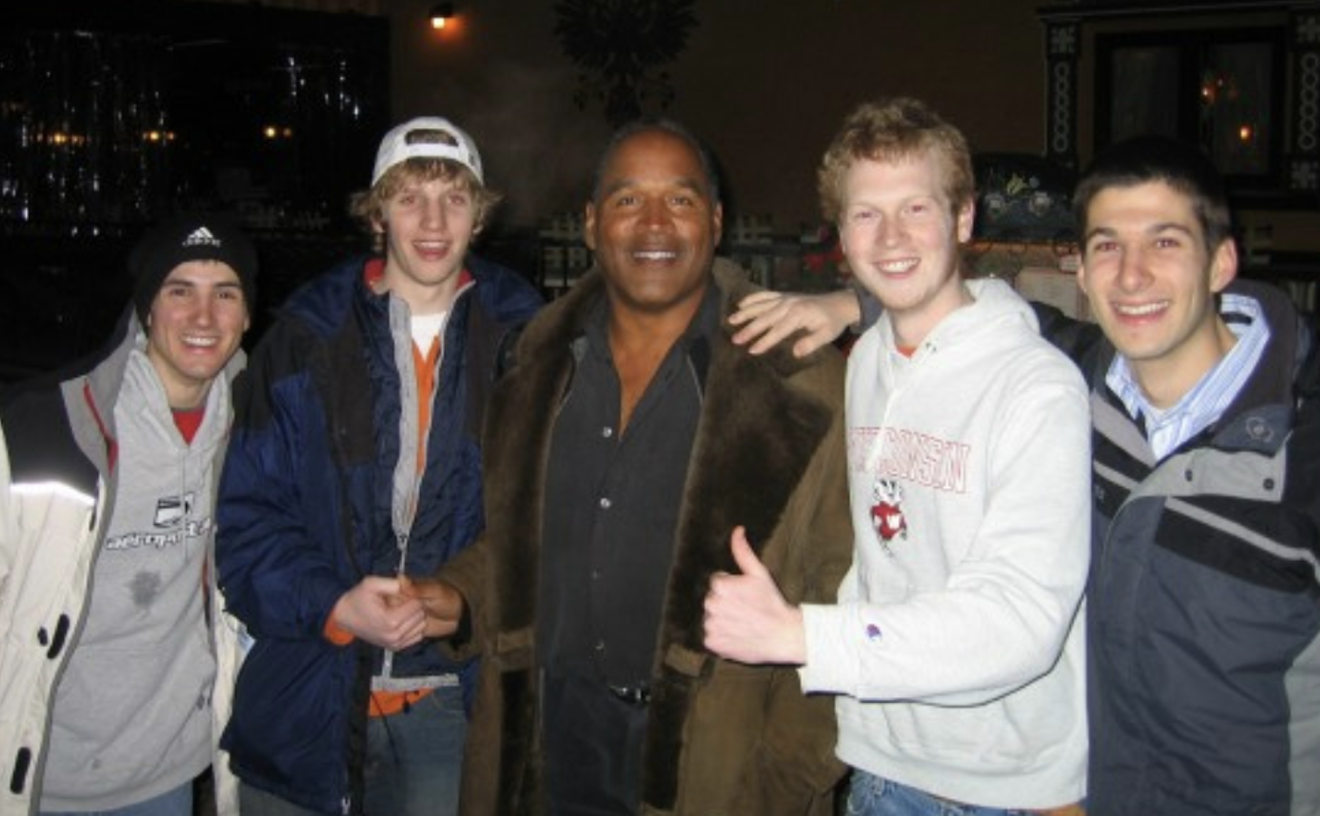Meet Castor Troy. With 27 wins in 35 lifetime starts, this 72-pound bundle of muscle, sinew and heart is currently the best racing greyhound in the state, conceivably one of the best in the country, and his 31.58-second clocking in the 1998 Interstate Inaugural on October 10 was the fastest trip this season around the 1,699-foot Adams Course at Mile High Kennel Club.
Never heard of this superbly conditioned athlete? You're not alone.
Last Friday afternoon, when Castor Troy went to the post in the $5,000 Interstate Kennel Club Juvenile Stakes, most upstanding Denver citizens were at home or at work, and dog racing was the furthest thing from their minds. The 1,002 souls who did venture out to Mile High--The Big Store, they used to call it--included some cigar-chewing retirees of notably ill temper, a few slick-looking dudes equipped with beepers and/or cell phones, and a smattering of hobbled grandmothers with eyes full of sorrow. There were more infants and preschoolers piled into strollers or picking discarded pari-mutuel tickets off the floor than you or the local social services departments might expect to see.
For Castor Troy's latest run, the hardened regulars were on hand, too. Steady as clockwork, several dozen of the more studious types had spread tattered bundles of old racing programs out on tables and silently buried their faces in their work, like Dickensian accountants. Meanwhile, the shouters and whiners and red-faces in the house screamed curses at the TV monitors every time their picks ran into trouble, boasted when they hit a $20 quiniela, and whimpered miserably when the fifth and ninth races turned out to be dark conspiracies against their unfailing instincts.
As usual, Big Nose was also at the track, begging to borrow twenty. "Pay you back Monday," he said. "Promise." The waistband of his shabby corduroys hung on the skinny rim of his butt, and grimy cuffs drooped into his shoes. "Hey. Make that Sunday. Pay you Sunday!"
Barely three minutes before the fourteenth race, which was the Inaugural, the management piped a brass-and-strings fanfare through the public-address system while the track announcer introduced the field. No one paid the least bit of attention. In a space the size of The Big Store, 1,002 people couldn't make much noise if they tried, and this sprinkling of the lame, the cranky and the hopeful were in no mood to cheer greatness. Alone or in tiny bunches, they sought only to refill a pocket at half past three on a dim Friday afternoon.
Casinos and state lotteries and $50 hockey tickets have put a dent in dog racing the last few years: Purses have shrunk drastically, the crowds have wandered off, and Mile High management doesn't even bother to race at night anymore, except on Saturdays. That means a champion like Castor Troy, who is just six victories away from the all-time single-season win record at Mile High, and the two-legged types who stand behind him must now toil away in stark isolation, mostly for the love of the game.
"That's just the way it is," says Gaylyn Breedlove, Troy's trainer at the top-ranked Plum Creek Kennel. "The pay is not as good anymore, but the excitement of seeing my dog win a race is...If you're in the business and really love the business, which I believe the majority of people out here do, you're only in it because you want to be. Because this is no easy job. It's seven days a week, and instead of raising your two or three children at home, you're raising fifty or sixty babies. You have to be with them all day long and all night long--in the kennel at nine at night, back in there at five in the morning."
Yes, but once in a while a dog like Castor Troy runs down the pike. And all the world suddenly looks rosier.
"We knew we had something special the first time we had him on the training track," the aptly named Breedlove says. "He was just so much better than the other puppies. At seventeen months he stood out. You could tell, just the way he ran then, that he was special. You get a feeling. We've had some really nice ones, like the great Oswald Cobblepot. Right now, I think this puppy is on pace to be as good, if not better."
Since going into training last May, Castor Troy has won 27 times and finished in the money in 32 of his 35 starts. He's been the betting favorite in all but one of his races. He deploys a classic running style: "Castor's usually the top dog when it comes to the first turn," Breedlove explains. "He rushes to the turn, he goes out, and from then on, it's his race. He's the consummate dog because he's never short; he's fast, and he's got the staying power to just keep extending his lead. He puts on a push through the backside and keeps rushing the whole time. Never gives an inch. By the way, he's also a lover. Always happy, always ready to play, his tail constantly at a beat."
Not a bad personality profile for a 72-pound streak of white-and-brindle fur named for the villain in the John Travolta/Nicolas Cage thriller Face/Off. If he gets six more wins--at greyhound racing's frantic pace, that could take just three more weeks--he'll break the single-season win record set last year by Beams Full Moon, who won 32 of his 48 starts. But in a world of diminishing returns and rare greatness, that won't be enough: Castor Troy will be asked to prove himself in the wider world.
"To be any kind of a stud dog," Plum Creek co-owner David Robinette explains, "he's gotta go other places and win." That will probably mean trying Castor Troy in heats for major-stakes races in Florida, Iowa or Kansas--maybe all three. And it will mean asking the youngster to adjust to differing track surfaces, configurations and conditions. No easy task for a two-year-old. But if Castor makes the grade in 1999 on ovals far and wide--and if he becomes a 100-race winner--his future in romance could prove profitable.
"This year Troy will probably make $15,000," Robinette says. "In the past, when dog racing was healthier, it might have been $50,000. For example, when I trained J.W. Rocket One (the 1982 and 1983 Mile High track champion), a top-grade win was worth about $1,600. Today it's only about $450. Over the year, only the top two or three kennels make a profit, numbers four and five hope to break even, and all the others--numbers six through thirty--are losing money."
But if Castor Troy turns out to be a top stud, he could earn half a million dollars in breeding fees.
How tough is that? "Double the odds of coming up with a racer as good as Troy or Beams Full Moon and you have a pretty good idea," Robinette says. "Because a thousand things can go wrong in this world, and they usually do. That's life."
On December 4, in the IKC Juvenile Championship, life struck again. The winner of five in a row and three straight qualifying heats (by a total of 28 lengths!), Castor Troy leaped from the number-six box as the 1-5 favorite, got shuffled back in the first turn and wound up running a dismal sixth--just the third time in his career he'd ever finished worse than third. Not to worry. Plum Creek's other Juvenile qualifier, Flare Factor, won the race, and one loss did not a career ruin. Not by a long shot.
"There's not much reward in this game anymore," Gaylyn Breedlove says. "But if you get a dog like Castor Troy, it's all possible. You get one like this and you know he'll do anything he can for you. You see that and you feel it. Once in a while you have to have a favorite, so Castor gets the extra rub here and there, and I have a special feeling for him. And yet I think every dog in my kennel is special--even my [grade] C's and D's. They give me everything they've got, and as long as I take care of them, they take care of me. That's the real reward. To see their passion for running, to see their heart."
Too bad so few are paying attention.










